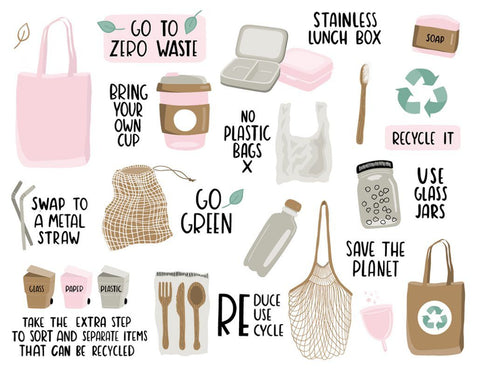The Rising Importance of Sustainability
In today's world, the concept of sustainability has gained immense traction, and for a good reason. As we face the pressing challenges of climate change, resource depletion, and environmental degradation, more people are seeking ways to minimize their impact on the planet. While the zero-waste lifestyle has gained popularity, it may seem daunting or impractical for some. The good news is that you can make a massive impact on sustainability without going fully zero waste. In this blog, we'll explore various sustainable living practices that can significantly reduce your ecological footprint.

-
Reduce, Reuse, Recycle:
- Start with the basics of sustainability. Reduce your consumption, reuse items when possible, and recycle responsibly. These simple actions can significantly decrease the waste generated by your household.
-
Embrace Secondhand and Thrift Shopping:
- Buying secondhand clothing, furniture, and household items not only saves money but also reduces the demand for new products. Thrift stores and online platforms offer a wide range of gently used items waiting for a second life.
-
Support Sustainable Brands:
- Choose to support brands and businesses that prioritize sustainability and ethical practices. Look for certifications like Fair Trade or organic, and research companies committed to reducing their environmental impact.
-
Conscious Food Choices:
- You don't have to be fully vegan or vegetarian to make a difference. Reducing meat consumption and choosing sustainably sourced seafood can have a positive impact. Additionally, buying local and organic foods supports more sustainable agricultural practices.
-
Reduce Energy Consumption:
- Implement energy-saving habits at home, such as turning off lights when not in use, using energy-efficient appliances, and sealing drafts. Consider renewable energy sources like solar panels if feasible.
-
Public Transportation and Carpooling:
- Reduce your carbon footprint by opting for public transportation, carpooling, biking, or walking whenever possible. This not only reduces emissions but also saves you money on fuel.
-
Cut Down on Single-Use Plastics:
- While achieving zero plastic waste can be challenging, you can significantly cut down on single-use plastics by using reusable bags, bottles, and containers. Say no to plastic straws and utensils.
-
Composting:
- Composting kitchen scraps and yard waste reduces the amount of organic material sent to landfills. You can create nutrient-rich soil for your garden and decrease methane emissions from decomposing organics.
-
Participate in Community Initiatives:
- Get involved in local sustainability efforts, such as community cleanups, tree planting, or supporting eco-conscious policies. Collective action often leads to more substantial positive changes.
-
Educate and Inspire Others:
- Share your sustainable living journey with friends, family, and social networks. By inspiring others to make small changes, you can amplify the impact of your actions.
Conclusion: Living a fully zero-waste lifestyle may not be feasible or appealing for everyone, but that doesn't mean you can't make a massive impact on sustainability. By adopting these sustainable living practices, you contribute to a greener, healthier planet without sacrificing your comfort or convenience. Remember, every small change you make adds up to create a more sustainable future for generations to come.






Leave a comment